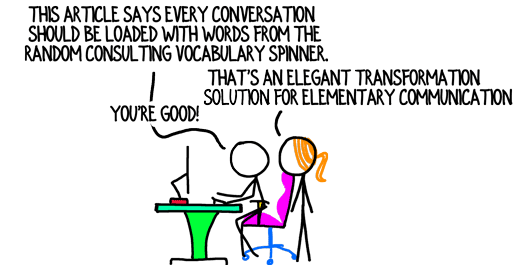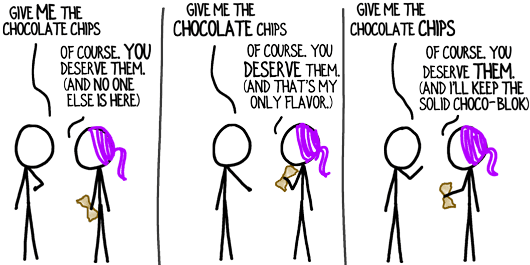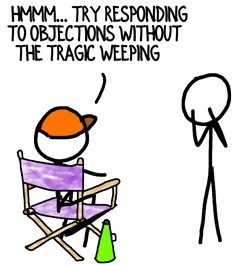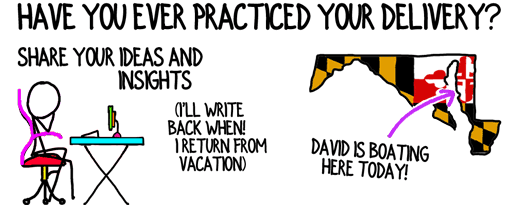After your consulting firm wins a project, you deliver the project to your client. However, there’s a different type of delivery that dramatically affects your success in business development. If you can stomach just a tiny bit of discomfort, you’ll enjoy dramatic results.
If you’ve perused many of the articles on this site and/or my books, you’ve probably noticed they’re littered with very specific, language suggestions. (Yes, with puns and chocolate references too.)

There are scripts and recipes for what to ask prospective consulting clients, how to respond to emails, how to shake loose stuck proposals and many other situations.
And despite my well-founded, data-driven assurances that these exact turns of phrase will work magic for you and your consulting firm, there’s a good chance you hesitate to use them.
Your reaction to some of my wording suggestions may sound like, “You can’t really say that to a prospect, can you?” or “I couldn’t say that” or “Oh man, that would never work” or “I can’t possibly say that now—the caramels have glued my teeth together.”
Those types of reactions used to puzzle me, because of course you can use those scripts verbatim. My team and I know for a fact that the techniques, approaches and phrases we recommend can increase your revenue 2x, 3x, 10x or even more.
So, why the resistance?
Because there’s a nuance that explains why language that is proven to be effective might feel totally wrong or misaligned to you.
The delivery.
The words you say matter… and how you say them is equally important.

Your inflection, tone, and body language (in person or on Zoom) all dramatically affect how your consulting prospect hears your words.
My personal demeanor is pretty casual. I’m a bit cheeky and very quick to laugh.
Before I ask a consulting prospect, “What fee would give you a heart attack?” my shoulders drop, my body opens, my eyes crinkle and a whimsical half-smile creeps onto my face. Unconsciously, I’m signaling to the prospect that I’m being playful. Then, I deliver the Heart Attack Question with unmistakable curiosity and good intentions.
That is, in large part, why I virtually always receive answers to questions that seem to go nowhere for other consultants.
When you read a script and think to yourself, “I couldn’t say that!” it’s because you’re hearing or envisioning a delivery of the script that feels awkward, uncomfortable or perhaps even offensive to you.
Change your delivery.
It’s time for you to practice like an actor.
Actors practice and deliver the same lines multiple different ways on their way to producing the Oscar-worthy performance that we all love. Sometimes the actor experiments of their own volition, and other times they receive guidance.
The Director says, “Try making it happier” or “After you say ‘Gotcha’ pause, and imagine Jimbo stole your cookie before saying, ‘little man.’”
The exact same words can sound complimentary when you offer them with a smile versus disparaging when you serve them with a sneer.

The simple step of practicing like an actor—finding the right delivery for important questions and messages—will unlock plenty of business for your consulting firm.
Many consultants are resistant to practicing like an actor. It feels contrived or artificial or unnecessary.
Contrived? Yes. Unnecessary? No!
As a consultant, you are in a language and communication-driven business. It’s worth braving a bit of discomfort and awkwardness to give conscious thought to your words, try out variations and practice.
I’m curious about your experience. What non-verbal cues do you consciously or unconsciously try to communicate when you’re speaking to clients?
Text and images are © 2024 David A. Fields, all rights reserved.

 David A. Fields Consulting Group
David A. Fields Consulting Group 

Hilarious – I wish I could get more humour into my drawings, the way you do it!
But yeah, I do often rehearse lines and bits of scripts. I’ll often talk to myself when driving, practicing and developing lines, scripts, way of wording things, intonations.
And then I’ll often practice them with friends as well.
I’ll ask “Hey, if you and I were in a sales call, and I’d throw this pitch at you, what would you reply?” And then I’ll give them what I’ve rehearsed, and then we talk about it.
Super useful!
Good on you for practicing, Martin and rehearsing with others. Thank you for providing a case-study example that others can follow–I’m sure other readers will follow your lead.
(Re the drawings, I generally just try to make myself laugh. As a result a lot are weak or obscure and occasionally one is quite funny.)
“To be, or not to be…successful?”
Well, Doc, I’m not sure any of us will write scripts like the Bard; however, Shakespeare wasn’t known for his consulting sales prowess, was he?! Thanks for adding your voice on this article, Doc.
I’ve been experimenting with “Clean Language” as a way of keeping my prospect front and center in the dialog. For delivery… mostly I’ve been focusing on my verbal, not my non-verbal behavior.
Since you ask, I think I use pauses and facial expressions to show engagement, and often repeat their last few words with a questioning intonation. For instance, if they say “I need my people to change” my follow-ups would probably include “You need THEM to change?” or “What sort of change?”
I then raise my eyebrows and lean my head forward a touch. And I stop talking and listen. 😉
Thomas, your attention to your own communication–verbal and non-verbal, are admirable and impressive. Repeating the last word or phrase as a question is what we call “Reflective Inquiry” and it’s surprisingly effective.
Thanks for providing your examples as part of this discussion, Thomas.
First of all, I laughed often. Second, I never thought to ask this before: do you create the artwork for your posts? If so, what a great skill. Third, I couldn’t belief the fee question. I loved it yet wonder if I would have the courage to ask it because I wouldn’t be prepared for the unwanted answer.
Years ago, and this has only happened once, I proposed a fee to a secondary decision maker, who told me (something you too recommended in a webinar), that I needed to raise my pricing. I was stunned.
I feel that lowering pricing after an objection shows a lack of confidence and therefore makes you unappealing and you lose a little respect. So I will have to find a way to ask that question and make it work in the favor of the prospective client, current client, and my practice.
I agree that how we communicate is a big determinant in being able to have the opportunity to do the work, negotiate stress points throughout it and be profitable.
Great piece, as always.
Three cheers for some laughs at work, Michael.
You can absolutely ask the Heart Attack Question. There are a few good articles on this site that provide more detail on the question, why it’s effective, and the benefits of using it.
(Yes, I create all the illustrations, though anyone with any artistic talent would take umbrage with you calling my drawings evidence of a skill set!)
Thanks for your feedback, your question and for joining the conversation, Michael
This sounds a lot more like play to MY strengths, than it does play to YOUR strengths.
My conversations with my clients got a lot easier when I let my natural curiosity and interest in their challenges take over, and stopped worrying about following a script.
Absolutely, Dave. In some ways, it’s the combination of strengths that’s important. Leverage the proven strength of certain verbiage and approaches to winning business, and leverage your own strengths in delivery. When you deliver excellent approaches fluidly, comfortably and confidently, then you become unstoppable.
I’m glad you raised that insight, Dave!